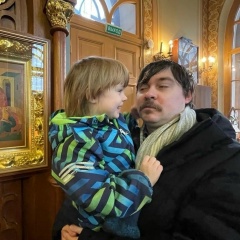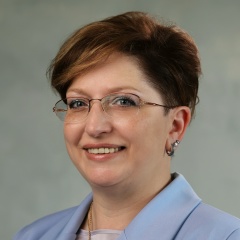http://superbook.azbyka.ru/LIBRARY/gregory_dvoeslov_sobesedovania/4.htm
Особенно актуальный отрывок:
Петр. Скажи еще, неужели вечно будут гореть те, которые однажды будут ввержены туда?
Григорий. Очевидно и несомненно истинно то, что как не будет конца блаженству добрых, так не будет конца и мучению злых. Ибо Сама Истина говорит: и пойдут сии в муку вечную, а праведники в жизнь вечную (Мф 25.46); и если справедливо то, что Бог обещает, то, без сомнения, не будет ложно то, чем угрожает.
Петр. А что, если кто скажет: "Бог только для того угрожает грешникам вечным мучением, чтоб удержать их от совершения грехов"?
Григорий. Если ложно то, чем Бог угрожал для удержания грешников от беззаконий, ложно также и то, что Он обещал для возбуждения к праведности. Но кто, кроме безумного, осмелится сказать это? И если Он угрожал Тем чего не исполнит, то прежде, нежели захотим признать Его милосердым, должны будем назвать Его (что страшно и сказать) лживым.
Петр. Желал бы я знать, как согласить с правосудием то, что за вину имевшую конец, будут терпеть бесконечное наказание?
Григорий. Справедливо было бы недоумение, если бы раздраженный Судья рассматривал не сердца людей, а одни дела. Нечестивые потому имели конец грехов, что имели конец жизни. Они желали бы, если бы могли, жить без конца чтоб иметь возможность грешить без конца. Те, которые никогда не перестают грешить во время своей жизни, показывают, что они желают всегда жить во грехе. Следовательно, великая справедливость со стороны судья, что вечно будут наказываемы те, которые в сей жизни никогда не хотели отстать от греха.
Петр. Но ни одного верного раба правдивый господин не судит с излишнею строгостью и лукавого раба повелевает бить только для того, чтоб исправить его пороки: ему наносятся удары в надежде исправления. Если же нечестивые, преданные геенскому огню, не достигнут исправления, то с какой целью будут вечно гореть?
Григорий. Всемогущий Бог как Милосердый управляет добрыми людьми без жестокости; но как Правосудный не перестанет вечно наказывать нечестивых. Впрочем, нечестивые люди, определенные на вечные мучения, хотя наказываются за свое нечестие, будут гореть и с другою некоторою целью. Все праведники увидят и блаженство в Боге, которое получат, и мучения грешников, которых избежали. И чем яснее увидят они вечное наказание за грехи, которые победили при помощи Божией, тем более будут сознавать себя вечными должниками Божественной благодати.
Петр. Как же мы будем считать святыми людей, которые не будут молиться за врагов своих, видя их в огне, когда сказано: молитесь за обижающих вас (Мф 5.44)?
Григорий. За врагов своих молятся в то время, когда могут обратить их сердца к плодотворному покаянию и спасти сим обращением. Ибо о чем другом должно молиться за врагов своих, как не о том, по завещанию апостола с кротостью наставлять противников, не даст ли им Бог покаяния к познанию истины, чтобы они освободились от сети диавола, который уловил их в свою волю (2Тим 2.25-26)? Как же тогда молиться за грешников, когда они уже никоим образом не будут в состоянии переменить свое нечестие на дела правды? Значит причина, почему тогда не будут молиться за людей, осужденных на вечный огонь, та же, какая и теперь причина того, что не молятся за диавола и аггелов его, присужденных к вечному наказанию. Какая и ныне причина того, что святые люди не молятся за умерших людей неверных и нечестивых, как не та, что узнали об них, как об осужденных на вечное наказание, и потому не хотят приносить тщетную молитву пред лицом Праведного Судии? Если же ныне живущие праведники не сострадают умершим и осужденным нечестивцам, когда сами сознают нечто достойное осуждения в своей плоти, тем строже будут смотреть на мучения нечестивых тогда, когда, свободные от всякой тленной страсти, еще тверже и полнее усвоят себе святость. Судное решение, принадлежащее Правосуднейшему Судии, так согласно с их духом, что решительно не позволяет им ни в чем различествовать от определений Его вечной правды.
Сам Григорий Двоеслов отмолил от адских мук императора Траяна, так что заподозрить его в отсутствии сострадания и милосердия сложно.
Еще там большое количество конкретных свидетельств о том, что сейчас называется "after death experience".
Особенно актуальный отрывок:
Петр. Скажи еще, неужели вечно будут гореть те, которые однажды будут ввержены туда?
Григорий. Очевидно и несомненно истинно то, что как не будет конца блаженству добрых, так не будет конца и мучению злых. Ибо Сама Истина говорит: и пойдут сии в муку вечную, а праведники в жизнь вечную (Мф 25.46); и если справедливо то, что Бог обещает, то, без сомнения, не будет ложно то, чем угрожает.
Петр. А что, если кто скажет: "Бог только для того угрожает грешникам вечным мучением, чтоб удержать их от совершения грехов"?
Григорий. Если ложно то, чем Бог угрожал для удержания грешников от беззаконий, ложно также и то, что Он обещал для возбуждения к праведности. Но кто, кроме безумного, осмелится сказать это? И если Он угрожал Тем чего не исполнит, то прежде, нежели захотим признать Его милосердым, должны будем назвать Его (что страшно и сказать) лживым.
Петр. Желал бы я знать, как согласить с правосудием то, что за вину имевшую конец, будут терпеть бесконечное наказание?
Григорий. Справедливо было бы недоумение, если бы раздраженный Судья рассматривал не сердца людей, а одни дела. Нечестивые потому имели конец грехов, что имели конец жизни. Они желали бы, если бы могли, жить без конца чтоб иметь возможность грешить без конца. Те, которые никогда не перестают грешить во время своей жизни, показывают, что они желают всегда жить во грехе. Следовательно, великая справедливость со стороны судья, что вечно будут наказываемы те, которые в сей жизни никогда не хотели отстать от греха.
Петр. Но ни одного верного раба правдивый господин не судит с излишнею строгостью и лукавого раба повелевает бить только для того, чтоб исправить его пороки: ему наносятся удары в надежде исправления. Если же нечестивые, преданные геенскому огню, не достигнут исправления, то с какой целью будут вечно гореть?
Григорий. Всемогущий Бог как Милосердый управляет добрыми людьми без жестокости; но как Правосудный не перестанет вечно наказывать нечестивых. Впрочем, нечестивые люди, определенные на вечные мучения, хотя наказываются за свое нечестие, будут гореть и с другою некоторою целью. Все праведники увидят и блаженство в Боге, которое получат, и мучения грешников, которых избежали. И чем яснее увидят они вечное наказание за грехи, которые победили при помощи Божией, тем более будут сознавать себя вечными должниками Божественной благодати.
Петр. Как же мы будем считать святыми людей, которые не будут молиться за врагов своих, видя их в огне, когда сказано: молитесь за обижающих вас (Мф 5.44)?
Григорий. За врагов своих молятся в то время, когда могут обратить их сердца к плодотворному покаянию и спасти сим обращением. Ибо о чем другом должно молиться за врагов своих, как не о том, по завещанию апостола с кротостью наставлять противников, не даст ли им Бог покаяния к познанию истины, чтобы они освободились от сети диавола, который уловил их в свою волю (2Тим 2.25-26)? Как же тогда молиться за грешников, когда они уже никоим образом не будут в состоянии переменить свое нечестие на дела правды? Значит причина, почему тогда не будут молиться за людей, осужденных на вечный огонь, та же, какая и теперь причина того, что не молятся за диавола и аггелов его, присужденных к вечному наказанию. Какая и ныне причина того, что святые люди не молятся за умерших людей неверных и нечестивых, как не та, что узнали об них, как об осужденных на вечное наказание, и потому не хотят приносить тщетную молитву пред лицом Праведного Судии? Если же ныне живущие праведники не сострадают умершим и осужденным нечестивцам, когда сами сознают нечто достойное осуждения в своей плоти, тем строже будут смотреть на мучения нечестивых тогда, когда, свободные от всякой тленной страсти, еще тверже и полнее усвоят себе святость. Судное решение, принадлежащее Правосуднейшему Судии, так согласно с их духом, что решительно не позволяет им ни в чем различествовать от определений Его вечной правды.
Сам Григорий Двоеслов отмолил от адских мук императора Траяна, так что заподозрить его в отсутствии сострадания и милосердия сложно.
Еще там большое количество конкретных свидетельств о том, что сейчас называется "after death experience".
http://superbook.azbyka.ru/LIBRARY/gregory_dvoeslov_sobesedovania/4.htm
Especially relevant excerpt:
Peter. Tell me, will those who will be thrown there one day forever burn?
Gregory. It is obvious and undoubtedly true that as there will be no end to the bliss of the good, so there will be no end to the torment of the evil. For Truth itself says: And these will go into everlasting torment, but the righteous into everlasting life (Matthew 25.46); and if what God promises is true, then no doubt what he threatens will not be false.
Peter. But what if someone says: “God only threatens sinners with eternal torment to keep them from committing sins”?
Gregory. If it is false that God threatened to keep sinners from lawlessness, it is also false that He promised to incite to righteousness. But who, besides the insane, dares to say this? And if He threatened That he would not fulfill, then before we want to recognize Him as merciful, we will have to call Him (which is scary to say) lying.
Peter. I would like to know how to reconcile with justice that those who had an end to blame will suffer endless punishment?
Gregory. Perplexity would be true if an annoyed judge did not consider people's hearts, but only cases. The wicked therefore had the end of sins because they had the end of life. They would wish, if they could, to live without end in order to be able to sin without end. Those who never stop sinning during their lifetimes show that they desire to always live in sin. Therefore, it is a great justice from the judge that those who in this life never wanted to lag behind sin will be punished forever.
Peter. But a true master does not judge a single faithful slave with excessive severity, and orders a crafty slave to beat him only in order to correct his vices: he is struck in the hope of correction. If the wicked, devoted to the hellish fire, have not achieved correction, then for what purpose will they burn forever?
Gregory. Almighty God as the Merciful rules good people without cruelty; but as the Judiciary does not cease forever punishing the wicked. However, wicked people, determined to be tormented forever, although punished for their wickedness, will burn for another purpose. All the righteous will see the bliss in God that they receive, and the torment of sinners that they escaped. And the clearer they see the eternal punishment for sins that have been conquered with the help of God, the more they will recognize themselves as eternal debtors of Divine grace.
Peter. How will we consider saints people who will not pray for their enemies, seeing them on fire, when it is said: pray for those who offend you (Matthew 5.44)?
Gregory. They pray for their enemies at a time when they can turn their hearts to fruitful repentance and save by this conversion. For what else should pray for their enemies, if not according to the will of the apostle to meekly admonish opponents, would God give them repentance to the knowledge of the truth, so that they would be freed from the net of the devil, who caught them in his will (2 Tim. 2.25- 26)? How, then, to pray for sinners when they will by no means be able to change their wickedness to the works of truth? So the reason why then they will not pray for people condemned to eternal flame is the same as the reason now that they do not pray for the devil and his agels sentenced to eternal punishment. What is the reason now that holy people do not pray for dead people of unfaithful and ungodly people, if not the one who learned about them as those condemned to eternal punishment, and therefore do not want to bring in vain prayer in the face of the Righteous Judge? If the living righteous people do not sympathize with the dead and condemned wicked, when they themselves recognize something worthy of condemnation in their flesh, they will look stricter at the torment of the wicked then when they, free from all perishable passion, will assimilate holiness even harder and more fully. The judgment, which belongs to the Judicial Judge, is so consistent with their spirit that it resolutely does not allow them to be discredited in any way from the definitions of His eternal truth.
Grigory Dvoeslov himself begged away from the hellish torment of Emperor Trajan, so it is difficult to suspect him of lack of compassion and mercy.
There is also a large amount of concrete evidence about what is now called "after death experience".
Especially relevant excerpt:
Peter. Tell me, will those who will be thrown there one day forever burn?
Gregory. It is obvious and undoubtedly true that as there will be no end to the bliss of the good, so there will be no end to the torment of the evil. For Truth itself says: And these will go into everlasting torment, but the righteous into everlasting life (Matthew 25.46); and if what God promises is true, then no doubt what he threatens will not be false.
Peter. But what if someone says: “God only threatens sinners with eternal torment to keep them from committing sins”?
Gregory. If it is false that God threatened to keep sinners from lawlessness, it is also false that He promised to incite to righteousness. But who, besides the insane, dares to say this? And if He threatened That he would not fulfill, then before we want to recognize Him as merciful, we will have to call Him (which is scary to say) lying.
Peter. I would like to know how to reconcile with justice that those who had an end to blame will suffer endless punishment?
Gregory. Perplexity would be true if an annoyed judge did not consider people's hearts, but only cases. The wicked therefore had the end of sins because they had the end of life. They would wish, if they could, to live without end in order to be able to sin without end. Those who never stop sinning during their lifetimes show that they desire to always live in sin. Therefore, it is a great justice from the judge that those who in this life never wanted to lag behind sin will be punished forever.
Peter. But a true master does not judge a single faithful slave with excessive severity, and orders a crafty slave to beat him only in order to correct his vices: he is struck in the hope of correction. If the wicked, devoted to the hellish fire, have not achieved correction, then for what purpose will they burn forever?
Gregory. Almighty God as the Merciful rules good people without cruelty; but as the Judiciary does not cease forever punishing the wicked. However, wicked people, determined to be tormented forever, although punished for their wickedness, will burn for another purpose. All the righteous will see the bliss in God that they receive, and the torment of sinners that they escaped. And the clearer they see the eternal punishment for sins that have been conquered with the help of God, the more they will recognize themselves as eternal debtors of Divine grace.
Peter. How will we consider saints people who will not pray for their enemies, seeing them on fire, when it is said: pray for those who offend you (Matthew 5.44)?
Gregory. They pray for their enemies at a time when they can turn their hearts to fruitful repentance and save by this conversion. For what else should pray for their enemies, if not according to the will of the apostle to meekly admonish opponents, would God give them repentance to the knowledge of the truth, so that they would be freed from the net of the devil, who caught them in his will (2 Tim. 2.25- 26)? How, then, to pray for sinners when they will by no means be able to change their wickedness to the works of truth? So the reason why then they will not pray for people condemned to eternal flame is the same as the reason now that they do not pray for the devil and his agels sentenced to eternal punishment. What is the reason now that holy people do not pray for dead people of unfaithful and ungodly people, if not the one who learned about them as those condemned to eternal punishment, and therefore do not want to bring in vain prayer in the face of the Righteous Judge? If the living righteous people do not sympathize with the dead and condemned wicked, when they themselves recognize something worthy of condemnation in their flesh, they will look stricter at the torment of the wicked then when they, free from all perishable passion, will assimilate holiness even harder and more fully. The judgment, which belongs to the Judicial Judge, is so consistent with their spirit that it resolutely does not allow them to be discredited in any way from the definitions of His eternal truth.
Grigory Dvoeslov himself begged away from the hellish torment of Emperor Trajan, so it is difficult to suspect him of lack of compassion and mercy.
There is also a large amount of concrete evidence about what is now called "after death experience".
У записи 1 лайков,
1 репостов.
1 репостов.
Эту запись оставил(а) на своей стене Виктор Петров



















![Стас Однолетков -=[strast]=- Стас Однолетков -=[strast]=-](https://sun9-50.vkuserphoto.ru/s/v1/ig2/BQKIUfD3kthNCNNY9BS69xiPt_GjwVRhAU8D64L6gfeFjcmrTqYrLAC9NKgCppVxwhm79Mi5RypIHhjSHOhQK2uy.jpg?quality=95&crop=347,544,400,400&as=32x32,48x48,72x72,108x108,160x160,240x240,360x360&ava=1&cs=200x200)


